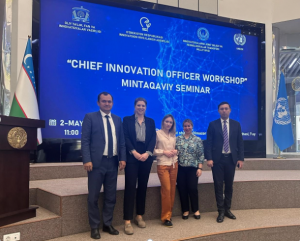The transition towards a circular economy could create an estimated 4.5 trillion USD of global economic growth by 2030, while helping to restore natural systems. Within the landlocked countries of Central Asia, this transition can help economies diversify away from a dependence on exports of finite resources, reduce negative environmental impacts, and create new business opportunities and jobs.
As highlighted in the Innovation for Sustainable Development Review (I4SDR) of Uzbekistan published by UNECE in 2022, innovation is a main facilitator of the transition to a circular economy. Innovation in this context is understood to reach beyond the narrow definition of high technology and start-ups: it involves introducing new products, services, and production, business and marketing processes that can foster sustainable growth and solve the challenges posed by the circular transition. Recent policy frameworks in Uzbekistan recognize this important link ; for example, circular economy indicators play a crucial role in the Strategy for the Transition of the Republic of Uzbekistan to a Green Economy (2019-2030). Meanwhile, the Strategy for Innovative Development of Uzbekistan (2022-2026) aims to create an innovation ecosystem that will connect industry, regions, and scientific/higher educational organizations for sustainable growth.
Since the publication of the I4SDR, Uzbekistan has taken several steps to implement the recommendations contained in the Review and recorded strong progress, becoming one of the top three innovation economies in Central and Southern Asia according to the 2022 WIPO Global Innovation Index. In 2023, the Government requested follow-up capacity building to spur further implementation. Innovation for the green and circular transition was highlighted as a topic of particular interest. In response to this request, UNECE staff and experts travelled to Tashkent on 1-3 May 2023 to launch a dedicated programme of activities.
UNECE and the National Office for Innovation Implementation and Technology Transfer organized a workshop for Chief Innovation Officers from over 100 state-owned enterprises (SOEs). The workshop introduced participants to circular economy concepts, highlighted the link between circular economy and innovation, and provided case studies and business models. Discussions also addressed green finance and green certification programmes. Given the prevalence of SOEs in the Uzbek private sector, the position of Chief Innovation Officer has been established in each SOE by Presidential decree. The workshop therefore served to enhance the efforts of the Government to foster a culture of innovation in these companies.
UNECE and the National Office also organized a roundtable with start-ups, which provided an opportunity to showcase the many promising green and circular products being developed in Uzbekistan, and exchange views on the challenges faced by Uzbek start-ups in scaling up their businesses. UNECE support to Uzbekistan will attempt to address some of these challenges, both through the dedicated programme and though ongoing work to empower business incubators and accelerators for sustainable development in Central Asia.
In addition to these capacity building activities, the UNECE delegation discussed upcoming activities with the National Office of Innovation Implementation and Technology Transfer, the Ministry of Economy and Finance and the Ministry of Agriculture, in order to ensure cross-sectoral targeting and alignment with national development priorities.
This UNECE capacity building programme for Uzbekistan will continue throughout 2023. It will offer trainings, policy dialogues, B2B conferences and other events for entrepreneurs, SOEs, business support institutions and policymakers, with the goal of empowering both private and public stakeholders to support the innovation process towards a circular economy.
UNECE assists its member States to better integrate into the world economy and to harness trade, innovation and infrastructure financing and investment for sustainable development in the region. UNECE normative tools cover many diverse areas, ranging from trade facilitation and agricultural quality standards to ESG traceability of supply chains, innovation and public private partnerships. UNECE also specifically supports its 17 programme countries in Central Asia, the Caucasus, the Western Balkans and Eastern Europe, in close cooperation with UN Country Teams.


